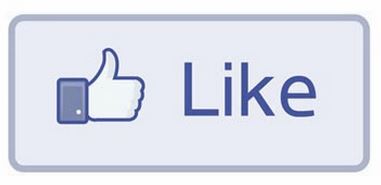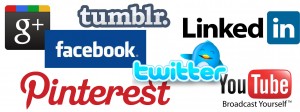September 5th, 2014 by Dr. Val Jones in Health Policy, Opinion
1 Comment »
 As a physician who openly despises many aspects of current EMRs (see “How An EMR Gave My Patient Syphilis” or “The Medical Chart: Ground Zero For The Deterioration Of Patient Care” ) I recognize that they are here to stay. And so, since we’re all stuck with these digital middlemen, I have some suggestions (based on popular social media platform functionality) for making them better.
As a physician who openly despises many aspects of current EMRs (see “How An EMR Gave My Patient Syphilis” or “The Medical Chart: Ground Zero For The Deterioration Of Patient Care” ) I recognize that they are here to stay. And so, since we’re all stuck with these digital middlemen, I have some suggestions (based on popular social media platform functionality) for making them better.
1. Likes. Healthcare providers should be able to “vote up” an excellent note in the medical record. Let’s face it, not all doctors are equally good at documentation. Untold hours of our time are spent trying to cull through pages of auto-populated, drop-down-box checks to figure out what’s actually going on with a patient on a particular day. Once in a while you stumble upon some comprehensive free text that a physician took the time to type after a previous encounter, and suddenly everything becomes clear. If there were a way to flag or “like” such documents, it would help other readers orient themselves more quickly to a patient’s history. A “liking” system is desperately needed in EMRs and would be a valuable time saver, as well as encouragement to physicians who document notes well. Hospitals could reward their best note makers with public recognition or small monetary bonuses.
2. #Hashtags. Tagging systems are sorely lacking in medical records systems, which makes them very difficult to search. Patients make multiple visits for various complaints, often with numerous providers involved. If physicians had the ability to review notes/records unique to the complaint that they are addressing, it would save a lot of time. Notes could be tagged with keywords selected by the author and permanently recorded in the EMR. This would substantially improve future search efforts. Even if the EMR generated 10 search terms (based on the note) and then asked the physician to choose the 3 most relevant to the current encounter, that would be a step in the right direction.
3. Selfies. Medical records would benefit from patient-identifier photographs. In a busy day where 20-30 patients are treated and EMR notes are updated after the patients have gone home, a small patient photograph that appears on each documentation page will serve the physician well in keeping details straight. Patients should be able to upload their favorite portrait to the EMR if the standard one (perhaps taken during the intake process) is not acceptable to them. In my experience, nothing brings back physical exam and history details better than a photograph of the patient.
4. Contextual links. All EMRs should provide links to the latest medical literature (on subjects specifically related to the patient’s current diseases and conditions) in a module on the progress note page. UpToDate.com and other reference guides could easily supply the right content (perhaps based on diagnosis codes). This will help physicians practice evidence-based medicine and keep current with changes in recommended treatment practices.
5. Microblogging. Sometimes there are important “notes to self” that a physician would like to make but don’t need to be part of the official medical record. EMRs should provide a free-text module (like a digital sticky note) for such purposes. These sticky notes should not be admissible in court as part of the medical record, and should not be uploaded to the cloud. Content included in these notes could include social information (patient’s daughter just had a healthy baby girl), hunches (patient looks slightly pale today – will check H&H next time if no change), and preliminary information (remember to review radiology result before calling patient next Tues).
It is my hope that EMRs will slowly adopt some best practices from top social media platforms. After all, if millions of users are effectively using voting, tagging, linking, searching and imaging in their daily online lives, it only makes sense to capitalize on these behaviors within the constraints of the medical environment. Maintaining strict confidentiality and appropriate professional boundaries (often missing in the social media world at large) is certainly possible with EMRs. Let’s build a better information capture and retrieval process for the sake of our patients, and our sanity.
***
At least one EMR is already providing #3 and #5 as part of its software: see MDHQ.com Are you aware of any others already implementing these ideas?
February 26th, 2013 by Dr. Val Jones in Opinion
12 Comments »
 When I first started blogging in 2006, the medical blogosphere consisted of a small group of physicians, nurses, and patient advocates. We knew each other well, and spent time each day visiting our favorite blogs and posting personal comments of encouragement and insight. We developed real friendships, and were optimistic about our brave new online writing frontier. We thought we could change the healthcare system for the better, we believed that our perspectives could influence policy, and we were sure that our writing could help our patients lead healthier lives.
When I first started blogging in 2006, the medical blogosphere consisted of a small group of physicians, nurses, and patient advocates. We knew each other well, and spent time each day visiting our favorite blogs and posting personal comments of encouragement and insight. We developed real friendships, and were optimistic about our brave new online writing frontier. We thought we could change the healthcare system for the better, we believed that our perspectives could influence policy, and we were sure that our writing could help our patients lead healthier lives.
I remember with great fondness the medical blogger conference that I attended in Las Vegas in 2009. It was the first time I’d met most of my blog friends in real life (IRL) – it was like seeing your favorite pen pals after years of correspondence. We talked all night, had marveled at how a love of writing had brought together a surgeon from South Africa, an ER nurse from California, and a Canadian rehab physician, among others. We figured that social media was the glue that held us all together. Since then, I am sad to say that for me, the glue has lost its stickiness due to dilution by third parties and a glut of poor quality content dividing attentions and exhausting our brains’ filter system.
Fast forward 7 years and most of my email correspondence is from strangers wanting to embed text links in my blog, people selling SEO services, or PR agencies inviting me to provide free coverage of their industry-sponsored conferences and webinars. I can’t think of a single friend who has left a comment on my blog in the past three months. Sure we see each other’s updates on Facebook and occasionally on Twitter, but I can’t remember the last real conversation we’ve had. Social Media has become irreversibly cluttered, and I’ve never felt more isolated or guarded about the future of medical writing.
My thoughts on this subject gelled when Twitter announced that LeBron James was following me (along with a select 80,000+ others). Obviously, LeBron has no idea who I am, and I’m almost certain he had nothing to do with his Twitter account following me. He, like many others, has outsourced his online relationship-making. It’s the ultimate irony – using social media to distance yourself from others, while maintaining an appearance of engagement. Sort of like sending a blow up doll of yourself to a party.
So what keeps some people going on these social media platforms? Perhaps it’s the allure of influence – the idea that many people are listening to you gives a sense of importance and meaning to your efforts. But take a cold hard look at your followers – do you know who most of them are? Or is there a large group of “hotchick123” type Twitter accounts counted among them? I used to block followers who didn’t seem real or relevant, but it became so much of a chore that I couldn’t keep up. I was overwhelmed by the Huns.
One could argue that my social media fatigue is my own fault – I didn’t screen my followers properly, I didn’t follow the “right” people, I haven’t curated my friendships with as much care as I ought to… But I know I’m not alone in my pessimism. A recent Pew Research poll suggests that people are leaving Facebook at a rapid rate. And as far as Twitter is concerned, it’s not for everyone.
I guess the bottom line for me is that social media isn’t as much fun as it used to be. I miss my blog friends, I miss the early days of being part of an online community. I don’t write as much as I used to because I don’t know my audience by name anymore. This “party” is full of strangers and I don’t like the familiarity that continues in the absence of true friendship.
Time to spend more of my energy on my patients, family, and friends IRL. And that’s a good lesson for a doctor to learn…
December 22nd, 2011 by AnthonyKomaroffMD in Research
No Comments »

The people you live with, work with, talk to, email, chatter with on Twitter and Facebook—your social network—can be good medicine, or bad.
The intriguing new science of social networks is demonstrating how personal interconnections can affect our health. Ideas and habits that influence health for better or for worse can spread through social networks in much the same way that germs spread through communities. In social networks, though, transmission can happen even though the people may be hundreds of miles apart.
An article in the December issue of the Harvard Men’s Health Watch explores how social networks can affect weight and mood.
Spreading weight
A study of people taking part in the landmark Framingham Heart Study found that Read more »
*This blog post was originally published at Harvard Health Blog*
November 5th, 2011 by Berci in Announcements
No Comments »

There is a new social campaign being launched right now on Webicina.com that curates the medical resources of social media in 80 topics in 18 languages:
We receive hundreds of suggestions from empowered patients and medical professionals every week about which social media resources should be included in our selections, and we thought we must find a way to let them know how much we appreciate their help.
So now we kindly ask you to tell us your story about how social media helped you improve your health management or helped you get better in your specialty in order to win grand prizes.
As we curate resources in basically all the social media platforms, you can tell your story in any platforms from Twitter and Facebook to blogs and Youtube. Your submissions will be Read more »
*This blog post was originally published at ScienceRoll*
November 4th, 2011 by BarbaraFicarraRN in News, Opinion
No Comments »

 Social media has changed the landscape in health care. Social media is a powerful and phenomenal platform to help educate consumers, raise awareness of health issues and connect with consumers and colleagues.
Social media has changed the landscape in health care. Social media is a powerful and phenomenal platform to help educate consumers, raise awareness of health issues and connect with consumers and colleagues.
Social media gives a voice to patients and consumers and it allows the conversation to get started with doctors and other health care professionals. Social media is all about the patient and it paves the way for new modern medicine to emerge.
Tapping into technology allows for the real-time and immediate exchange of information.
Consumers and physicians tapping into social media networking
According to a study published by Pew Internet and American Life Project, 65% of adult internet users use social networking sites and 80% of internet users gather health information online.
In a recent study by QuantiaMD and Care Continuum Alliance, over 65% of physicians Read more »
*This blog post was originally published at Health in 30*
 As a physician who openly despises many aspects of current EMRs (see “How An EMR Gave My Patient Syphilis” or “The Medical Chart: Ground Zero For The Deterioration Of Patient Care” ) I recognize that they are here to stay. And so, since we’re all stuck with these digital middlemen, I have some suggestions (based on popular social media platform functionality) for making them better.
As a physician who openly despises many aspects of current EMRs (see “How An EMR Gave My Patient Syphilis” or “The Medical Chart: Ground Zero For The Deterioration Of Patient Care” ) I recognize that they are here to stay. And so, since we’re all stuck with these digital middlemen, I have some suggestions (based on popular social media platform functionality) for making them better.

 When I first started blogging in 2006, the medical blogosphere consisted of a small group of physicians, nurses, and patient advocates. We knew each other well, and spent time each day visiting our favorite blogs and posting personal comments of encouragement and insight. We developed real friendships, and were optimistic about our brave new online writing frontier. We thought we could change the healthcare system for the better, we believed that our perspectives could influence policy, and we were sure that our writing could help our patients lead healthier lives.
When I first started blogging in 2006, the medical blogosphere consisted of a small group of physicians, nurses, and patient advocates. We knew each other well, and spent time each day visiting our favorite blogs and posting personal comments of encouragement and insight. We developed real friendships, and were optimistic about our brave new online writing frontier. We thought we could change the healthcare system for the better, we believed that our perspectives could influence policy, and we were sure that our writing could help our patients lead healthier lives.


 Social media has changed the landscape in health care. Social media is a powerful and phenomenal platform to help educate consumers, raise awareness of health issues and connect with consumers and colleagues.
Social media has changed the landscape in health care. Social media is a powerful and phenomenal platform to help educate consumers, raise awareness of health issues and connect with consumers and colleagues.







